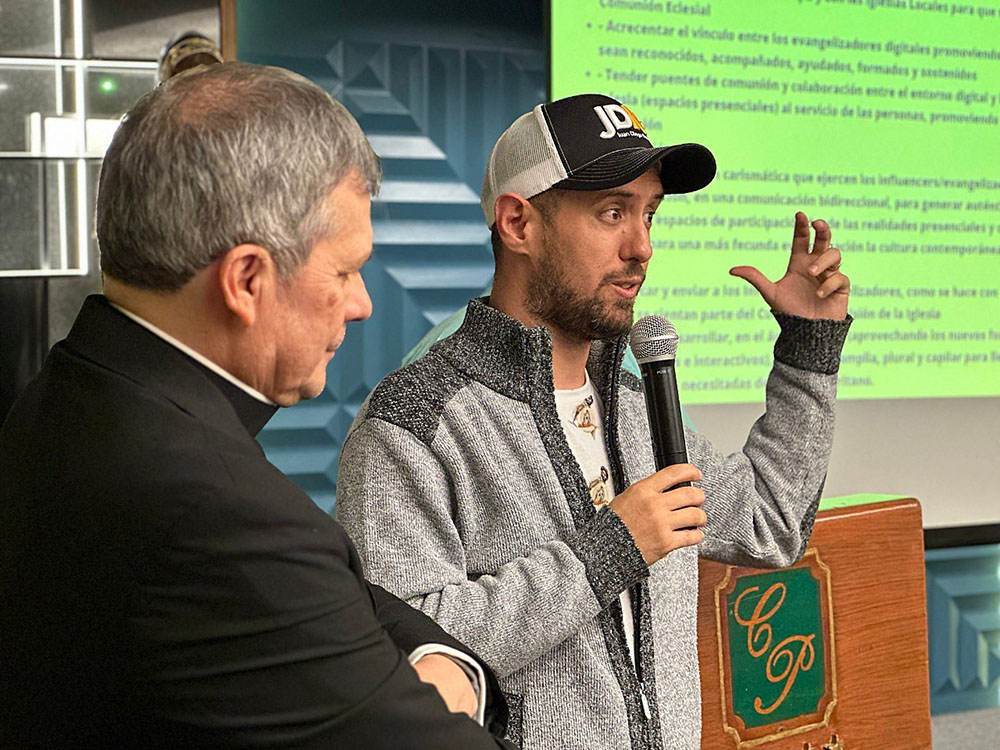
(Dreamstime/Chernetskaya)
When Francis Xavier reached India or Mother Cabrini arrived in the United States, neither believed they would make converts overnight.
First, they had to get to know people, learn the language and appreciate the local customs and culture. Only then could they begin to evangelize.
And according to some of the participants at last October's synod on synodality, it's time for the church to apply that same approach to the digital world.
"We have never been afraid as a church for 20 centuries to be out there," José Manuel De Urquidi told me. "You were sent on a mission and who could know what would happen?"
For Urquidi, who is the founder of the Juan Diego Network, which supports Catholic digital ministries to connect with Latinos, the church has always been aware that sending missionaries into new frontiers entails risks, including that of martyrdom.
José Manuel De Urquidi makes the case that the internet is 'a place of encounter' and that 'it's not a tool, but rather a culture.'
"We've never been afraid of that," he said. "Why are we now afraid of the internet? What's the difference?"
During last fall's synod, Urquidi was one of a few voices who over the course of the monthlong summit continually made the case that the internet is "a place of encounter" and that "it's not a tool, but rather a culture."
His message was direct: Like those earlier missionaries of centuries past, the digital space is "a place where we need to be. We need to learn the language and to engage."
And being only 39 years old, Urquidi is a young adult representing a target demographic that most church leaders are desperate to have more of in their pews.
Pioneering work in this arena began over a year before the 400 synod delegates arrived in Rome. Under the banner of "The Church is listening" (also known as the "digital synod"), it was the brainchild of Msgr. Lucio Ruiz, secretary of the Vatican's Dicastery for Communication.

José Manuel De Urquidi (right) speaks about the initiative "The Church is listening" as Msgr. Lucio Ruiz, secretary of the Vatican's Dicastery for Communication, looks on. (OSV News/Courtesy of Juan Diego Network)
The project galvanized "digital missionaries" — in a group that began with 250 people and has now exceeded 2,000 — to actively engage Catholics and non-Catholics alike so that their voices could be included as part of the synthesis document during the continental stage of the synod.
The idea was for these digital missionaries — Catholics with large followings online — to use mediums like podcasts, WhatsApp and social media platforms to engage people in conversation and, most importantly, to listen to their concerns.
The result: tens of thousands of respondents, many nonbelievers, who wanted to contribute to the conversation about how the church might become more welcoming, care for migrants and the environment, engage in peace-building and support families and young people.
"You must go where the people are," Ruiz told me. "As a missionary, you must go and learn the language, learn the music and learn the culture in order to express the message for them."
Advertisement
During the first week of the synod, Purity of Mary Sr. Xiskya Valladares of Nicaragua was one of the first delegates to formally bring up the topic of the church's digital mission.
Known as the "Twitter nun," Valladares told the room — including the pope — that within the digital realm, she encounters people who "need to heal their wounds."
"It is not enough to tell them the Mass schedule or invite them to visit the cathedral if we have not first engaged in dialogue with them, getting closer in order to listen to them," she said. "Sometimes they feel confused or ashamed, and they need a 'travel companion' to assist them. To be that companion, we need to step outside of ourselves, our ways of thinking, to meet them, listen to them, and accompany them."
Reflecting back on that moment, Valladares told me that many synod delegates began to approach her and De Urquidi at coffee breaks or during small group discussions to learn more about what ideas they had about the church's digital mission. Many people were concerned about reaching young people and felt as if this might be a useful starting point.
When the synod's synthesis document was published at the end of October 2023, it dedicated one of its 20 chapters to this very theme.
Under the title "Mission in the Digital Environment," Chapter 17 proposes the creation of collaborative networks of digital missionaries in order to "unleash new energies for new forms of mission."
"It's not just enough to create content," such as posting on Instagram or TikTok, Ruiz insisted, but rather it's about entering the digital culture and relating with real people there.
"The ultimate goal is to bring back people to a sacramental life," said De Urquidi. "But sometimes the journey has a hundred steps."
As for what comes next, De Urquidi — who was born and raised in Mexico but now lives in the United States, where he has helped launch nearly 100 podcasts — says it's important for bishops to start figuring out who the digital missionaries are in their diocese and taking the time to get to know them. And for the missionaries to meet their bishop, as well.
'You must go where the people are. As a missionary, you must go and learn the language, learn the music and learn the culture in order to express the message for them.'
—Msgr. Lucio Ruiz
The hope is that dioceses will recognize their digital missionaries, find ways to form them, send them on mission and then accompany them in their ministry.
Ruiz told me that a few dioceses already have an organized digital mission, others are just beginning to think and ask about it, while for most it's still completely new.
But while the digital mission is deeply connected to the synod, De Urquidi is quick to remind me that the Vatican meeting is only a starting point.
"It's the start of the church recognizing the internet as a mission frontier," he insisted.
"People are in search of meaning, they're in search of love, they're in search of truth. They're in search of God, most of them without knowing," he continued. "People aren't going to church, but they're on their devices. So we have to go to them there and show them the One who is love."







